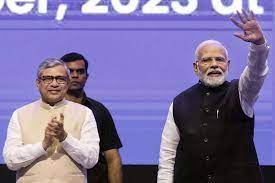NEW DELHI, Oct 29: The Government wants India’s telecom service to remain the most affordable in the entire world, Union Telecom Minister Ashwini Vaishnaw said.
According to the telecom sector industry body Cellular Operators Association of India, telecom operators have not been able to monetise 5G service since its launch last year.
“From the government side we are very clear. We would like telecom service to continue to remain the most affordable in the entire world and today among all large economies India’s telecom sector is the most affordable telecom sector,” Vaishnaw told PTI in an interview at India Mobile Congress 2023.
According to analysts, telecom operators need an average revenue per user (ARPU) in the range of Rs 270-300 over next three years to realise the investments they are making in building 5G networks.
At present ARPU in India is in the range of Rs 140-200 compared to global average of Rs 600-850 and about Rs 580 in China.
Telecom operators have been demanding that 4-5 apps that generate large traffic on their network should pay revenue share based on the business they generate from India to compensate for the network cost.
Bharti Airtel and Reliance Jio are the only two out of four mobile service providers that have rolled out 5G services and their combined investment in 5G network is estimated to be around Rs 3 lakh crore including the cost of spectrum.
Both the companies have not yet started charging for 5G data usage.
While debt ridden Vodafone Idea non-executive additional director Kumar Mangalam Birla at the event announced that the company will make significant investments to roll out 5G network and expand 4G coverage in the coming quarters.
Vaishnaw said that BSNL is rolling out a 4G network which will be ramped up after Diwali and later upgraded to 5G network.
In response to a question on India’s roadmap towards 6G, Vaishnaw said that the prime minister has set a target for the Indian telecom sector to take leadership in 6G.
He said Bharat 6G Vision has been formed and accepted by the International Telecom Union — a UN body that finalises global telecom standards.
The minister said the Bharat 6G Alliance comprising industry, academia, students and government has been created to work on 6G.
“We have divided the spectrum of things in 5-6 large groups and each of the groups — the antenna group, the waveform group, equipment group, are working very sincerely and devotedly on developing new technology.
“The target and vision that the prime minister has given us … India will emerge as a leader in 6G technology,” Vaishnaw said.
The minister said that a second set of telecom reforms have started with focus on user’s protection.
“We are seeing a series of instalments of reforms, one after the other, which are focussed on customer protection like Sanchaar Sathi. These are very strong initiatives which will make sure that cyberworld remains safe and trusted,” Vaishnaw said.
In the first set of reforms approved by the Cabinet in September 2021, the Government announced several measures to lower financial burden on telecom operators and generate liquidity in the sector.
The move helped telecom players mitigate the impact of Supreme Court judgement on adjusted gross revenue dues that has put liability to the tune of Rs 1.53 lakh crore on old mobile phone service providers like Bharti Airtel, Vodafone Idea, BSNL, MTNL etc. (PTI)
Trending Now
E-Paper


